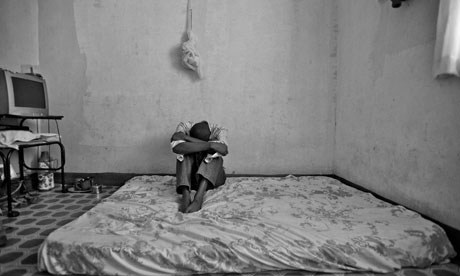Rape is an act of violence and domination and anger. It uses sexual acts including penetration as weapons. Rape is a subject which most people find uncomfortable. For women it conjures up all kinds of images. Some of us will think of dirty old men in plastic coats, or a monster too gross to think about. Others will have more specific ideas about rape, perhaps thinking about a certain group of men such as ‚weirdos‘ in dark alleys.


Every woman in our society feels the fear of rape – no woman is allowed to ignore it. We are taught as children to be afraid of ’strange men‘ who offer us sweets, lifts, etc. Women are taught as adults to keep our doors locked, not to be alone, not to look or act in any way that might ‚bring rape upon ourselves‘. Perhaps the most obvious situation in which we are taught to be afraid is when we walk home alone at night. The threat of violence is a total intrusion into women’s personal space and transforms a routine and/or potential pleasurable activity (for example, a walk in the park, a quiet evening at home, a long train journey) into a potentially upsetting, disturbing and often threatening experience.
causes of rape
Rape myths give people a false sense of security by minimising and/or denying the prevalence of sexual violence.
They accomplish this by blaming the victim and making excuses for the perpetrator. In effect these myths perpetuate sexual violence because they play a powerful part in defining responses to rape and create an excuse not to address the realities of sexual violence.
The next step is to get help:
Go to a safe place such as the home of a trusted friend or family member.
If you want to report the assault to the police it is up to you. But the sooner you report rape the more forensic evidence can be collected by the police or a SARC.
Check with your local police station to see if they have a specialist worker. Ask to speak to a specially trained Sexual Offences Liaison Officer (SOLO or SOIT).
If you are not sure what you want to do, go along, with a friend, to your nearest Sexual Assault Referral Centre where you can have a forensic and medical examination. They can store the forensic results until you make up your mind whether to report to the police or not.
If you do not wish to take legal action, it may be important that you receive medical attention. You do not have to have a forensic examination if you go a SARC, A & E or your GP. You may need to receive treatment for your injuries, emergency contraception, and checks for STIs.
Rape Crisis Centres specialise in rape trauma support and counselling. You can contact any of the help lines and / or arrange to see a specialist sexual violence counsellor. If there is not a rape crisis centre in your area, you will be given details of appropriate specialist counsellors
HIV & rape
PEP (post exposure prophylaxis = a course of medication) to prevent contacting HIV as a result of rape can be taken by women and men. It is important to take this medication as early as possible after an assault as the time frame for taking it is 72 hours post assault. Taking a full course of PEP means to be on this medication for 28 days. PEP needs to be prescribed and is not freely available.
An appropriately trained doctor, such as a doctor based at a SARC (Sexual Assault Referral Centre), at an A&E department or at a sexual health clinic can advise on the risk of contracting HIV following assault. This risk depends on many factors such as number of assailants involved, the ‘type‘ of assault and whether or not there were injuries (e.g. anal/vaginal injuries). It could also matter whether it is known where the assailants are from and whether they have undertaken any travel to parts of the world with higher HIV infection rates.
In addition to this, some people tend to be more worried about HIV than others and PEP may be offered to those really worried even though they are not at a high risk of having contracted HIV after the assault. However, this needs careful consideration due to the side effects involved.
PEP has many unpleasant side effects and this should be discussed with the prescribing doctor. Taking PEP also means that regular monitoring and tests are vital and this involves a range of appointments at the SARC/PEP clinic/prescriber.
Men rape as a cruel weapon of war
Sexual violence against men is used worldwide as a weapon of war – but hardly anyone talks about the cruel acts. Just the victims, it is difficult to break the taboo and put their experiences into words: a man, his name is Job, holds his head in his hands and looks at the ground in shame, as he begins to speak softly and sadly: „I was arrested by soldiers and taken to prison. where two soldiers tied my hands and legs and raped me, one after the other. „
